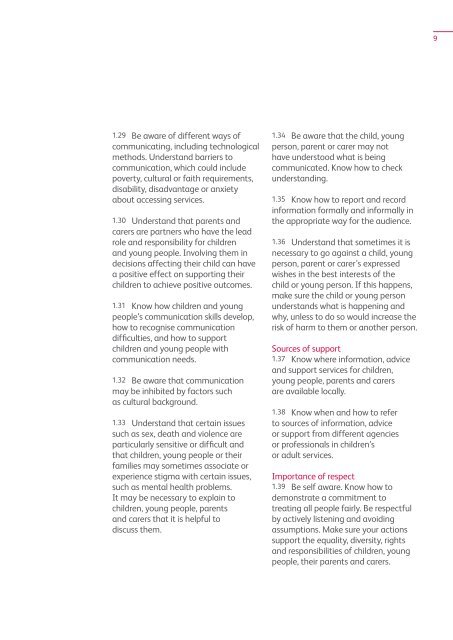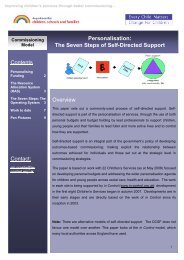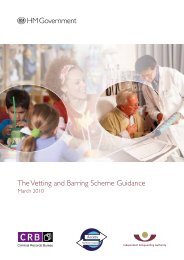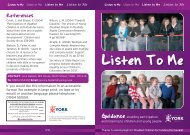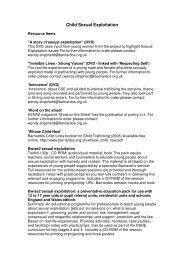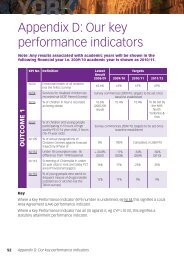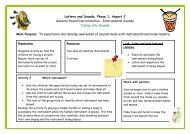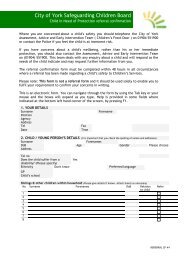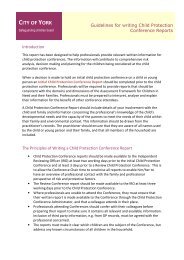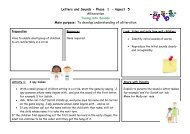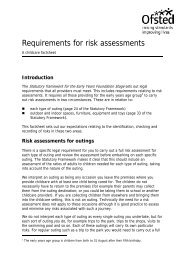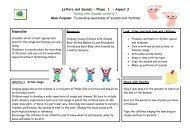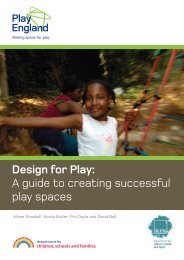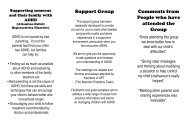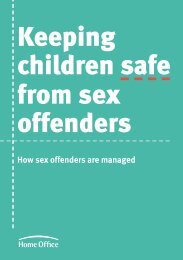The common core of skills and knowledge - Knowledge Hub
The common core of skills and knowledge - Knowledge Hub
The common core of skills and knowledge - Knowledge Hub
Create successful ePaper yourself
Turn your PDF publications into a flip-book with our unique Google optimized e-Paper software.
9<br />
1.29 Be aware <strong>of</strong> different ways <strong>of</strong><br />
communicating, including technological<br />
methods. Underst<strong>and</strong> barriers to<br />
communication, which could include<br />
poverty, cultural or faith requirements,<br />
disability, disadvantage or anxiety<br />
about accessing services.<br />
1.30 Underst<strong>and</strong> that parents <strong>and</strong><br />
carers are partners who have the lead<br />
role <strong>and</strong> responsibility for children<br />
<strong>and</strong> young people. Involving them in<br />
decisions affecting their child can have<br />
a positive effect on supporting their<br />
children to achieve positive outcomes.<br />
1.31 Know how children <strong>and</strong> young<br />
people’s communication <strong>skills</strong> develop,<br />
how to recognise communication<br />
difficulties, <strong>and</strong> how to support<br />
children <strong>and</strong> young people with<br />
communication needs.<br />
1.32 Be aware that communication<br />
may be inhibited by factors such<br />
as cultural background.<br />
1.33 Underst<strong>and</strong> that certain issues<br />
such as sex, death <strong>and</strong> violence are<br />
particularly sensitive or difficult <strong>and</strong><br />
that children, young people or their<br />
families may sometimes associate or<br />
experience stigma with certain issues,<br />
such as mental health problems.<br />
It may be necessary to explain to<br />
children, young people, parents<br />
<strong>and</strong> carers that it is helpful to<br />
discuss them.<br />
1.34 Be aware that the child, young<br />
person, parent or carer may not<br />
have understood what is being<br />
communicated. Know how to check<br />
underst<strong>and</strong>ing.<br />
1.35 Know how to report <strong>and</strong> record<br />
information formally <strong>and</strong> informally in<br />
the appropriate way for the audience.<br />
1.36 Underst<strong>and</strong> that sometimes it is<br />
necessary to go against a child, young<br />
person, parent or carer’s expressed<br />
wishes in the best interests <strong>of</strong> the<br />
child or young person. If this happens,<br />
make sure the child or young person<br />
underst<strong>and</strong>s what is happening <strong>and</strong><br />
why, unless to do so would increase the<br />
risk <strong>of</strong> harm to them or another person.<br />
Sources <strong>of</strong> support<br />
1.37 Know where information, advice<br />
<strong>and</strong> support services for children,<br />
young people, parents <strong>and</strong> carers<br />
are available locally.<br />
1.38 Know when <strong>and</strong> how to refer<br />
to sources <strong>of</strong> information, advice<br />
or support from different agencies<br />
or pr<strong>of</strong>essionals in children’s<br />
or adult services.<br />
Importance <strong>of</strong> respect<br />
1.39 Be self aware. Know how to<br />
demonstrate a commitment to<br />
treating all people fairly. Be respectful<br />
by actively listening <strong>and</strong> avoiding<br />
assumptions. Make sure your actions<br />
support the equality, diversity, rights<br />
<strong>and</strong> responsibilities <strong>of</strong> children, young<br />
people, their parents <strong>and</strong> carers.


